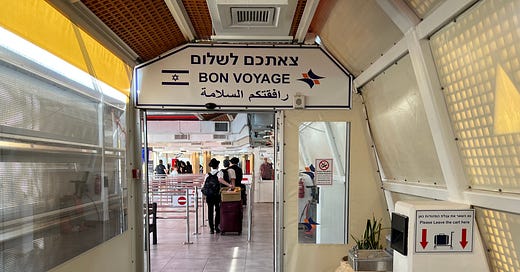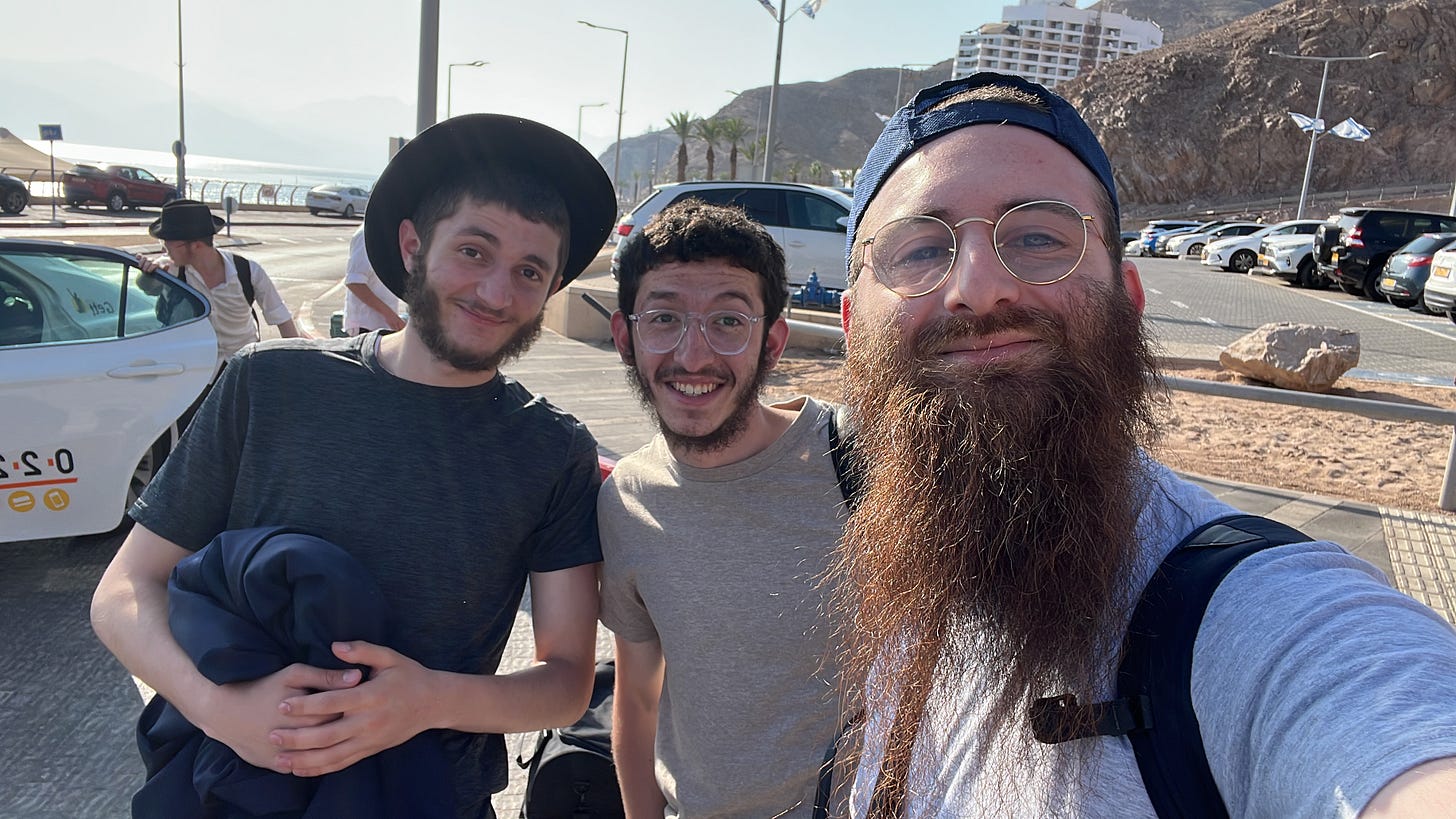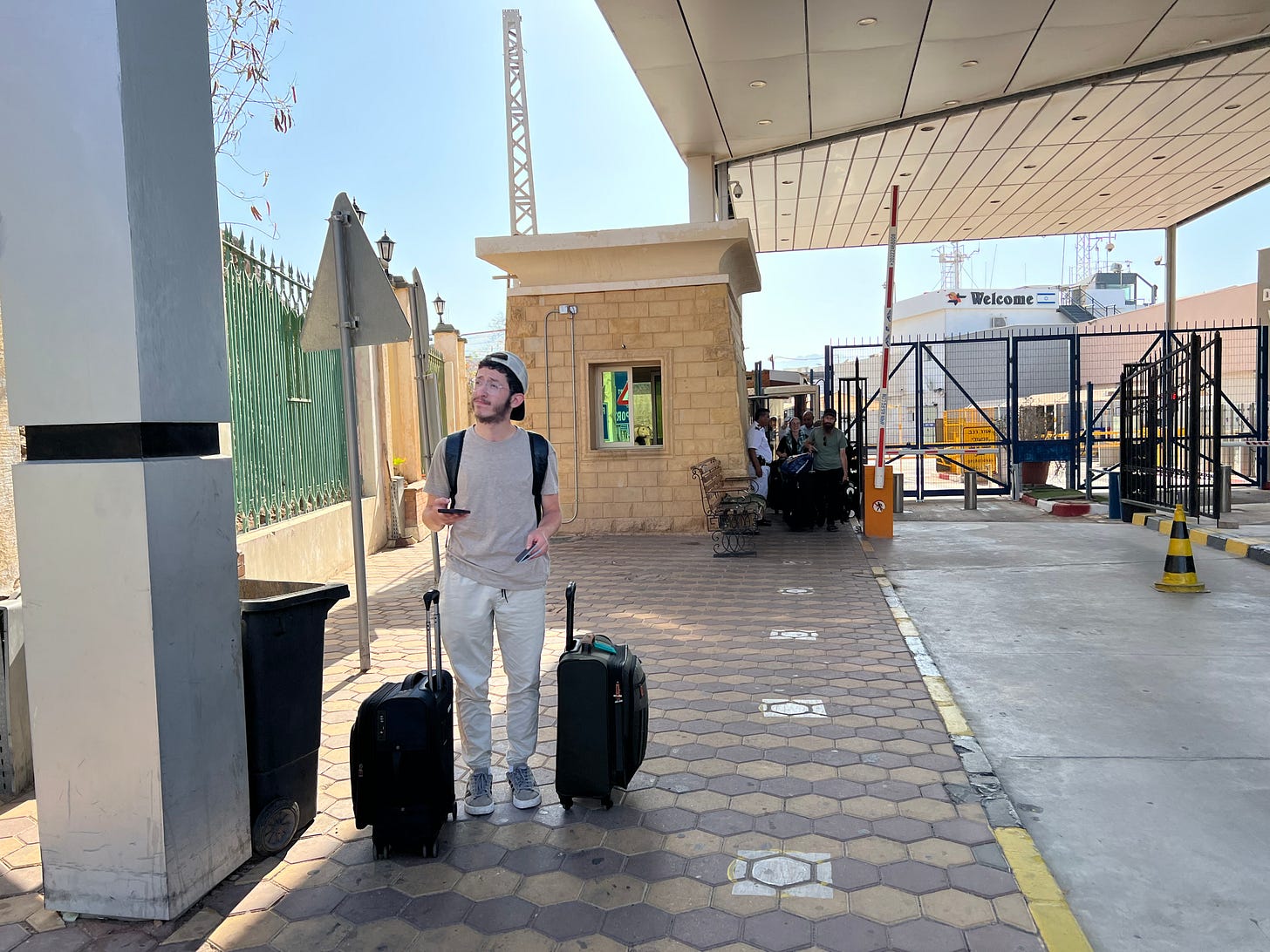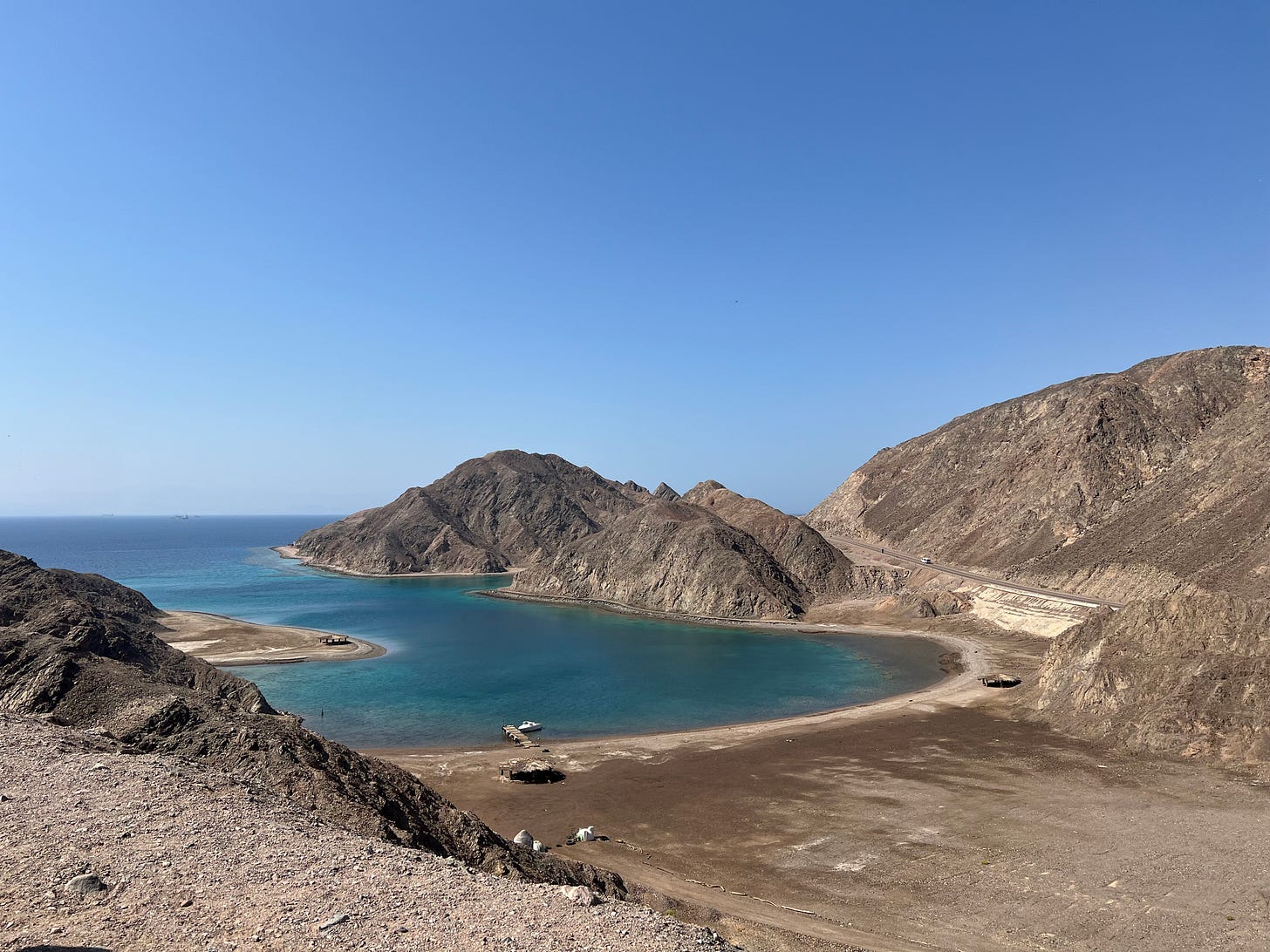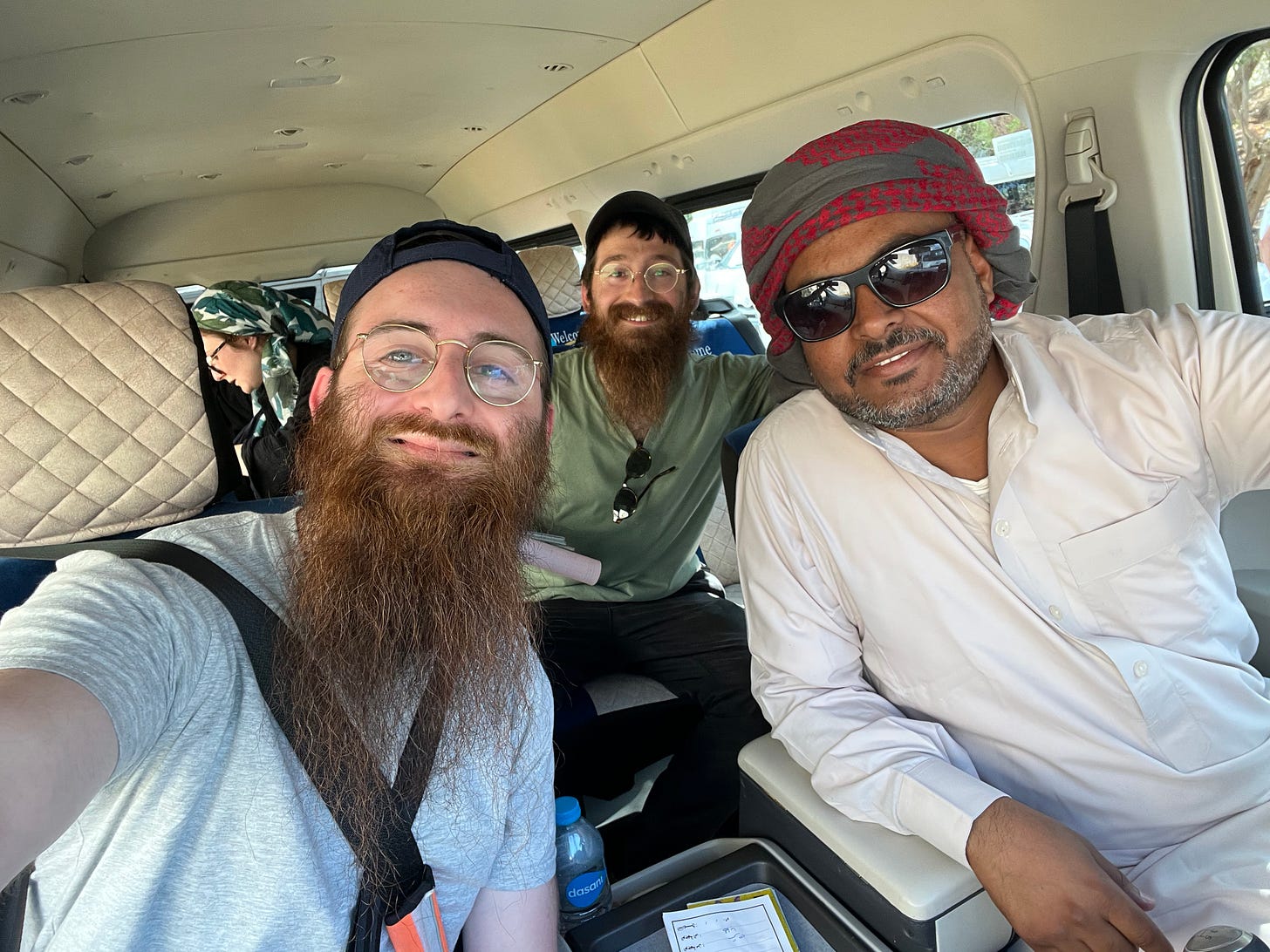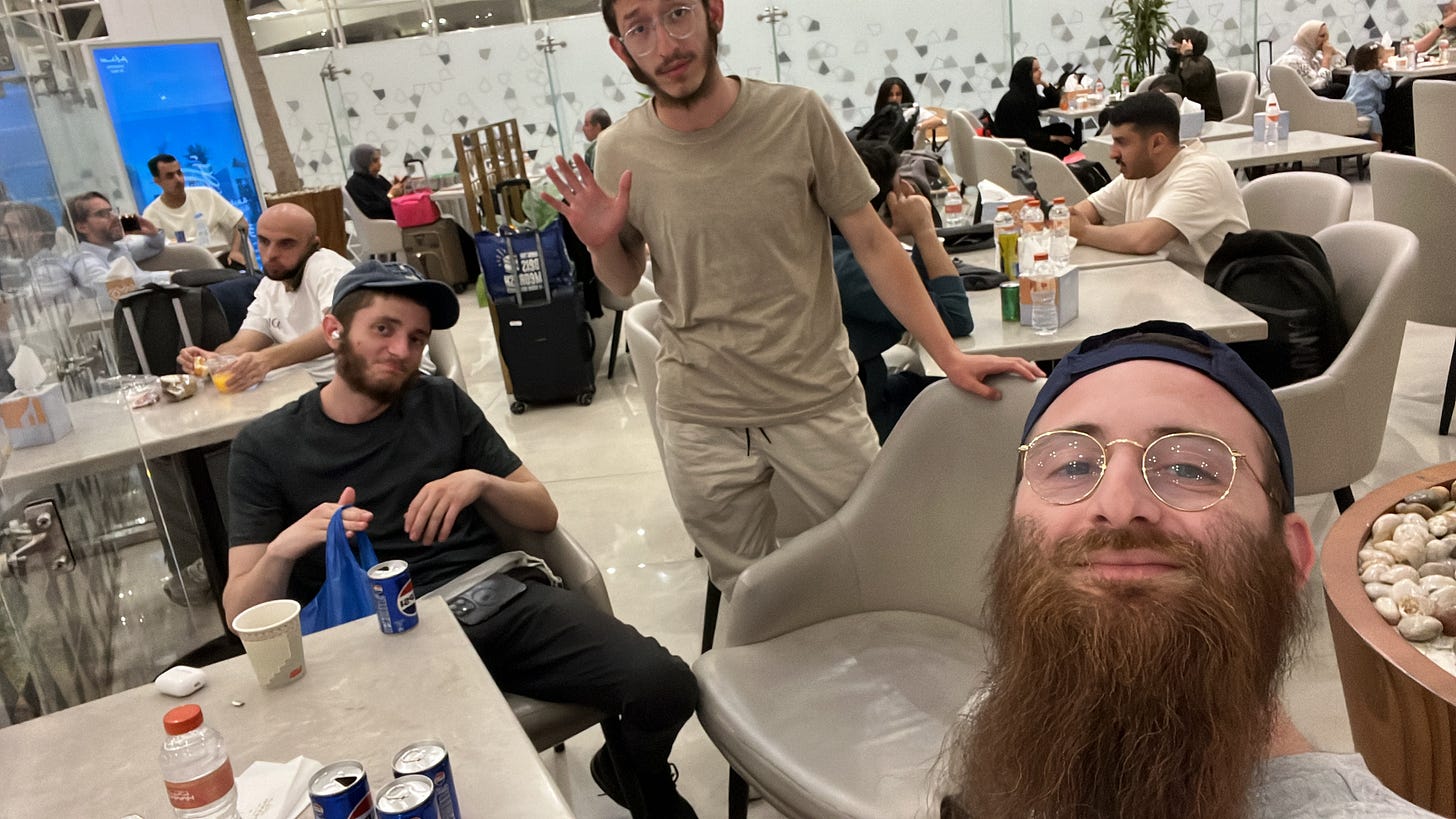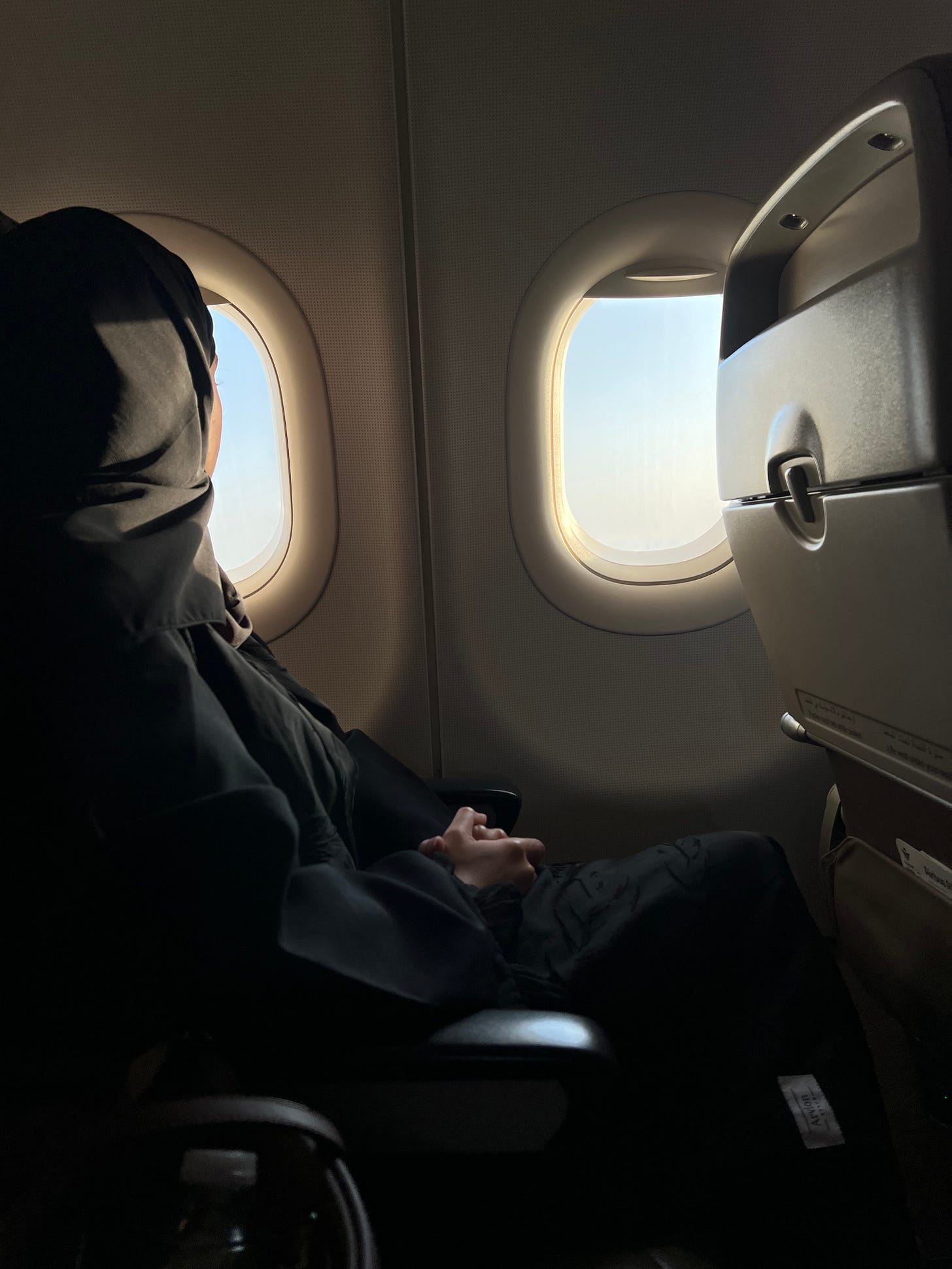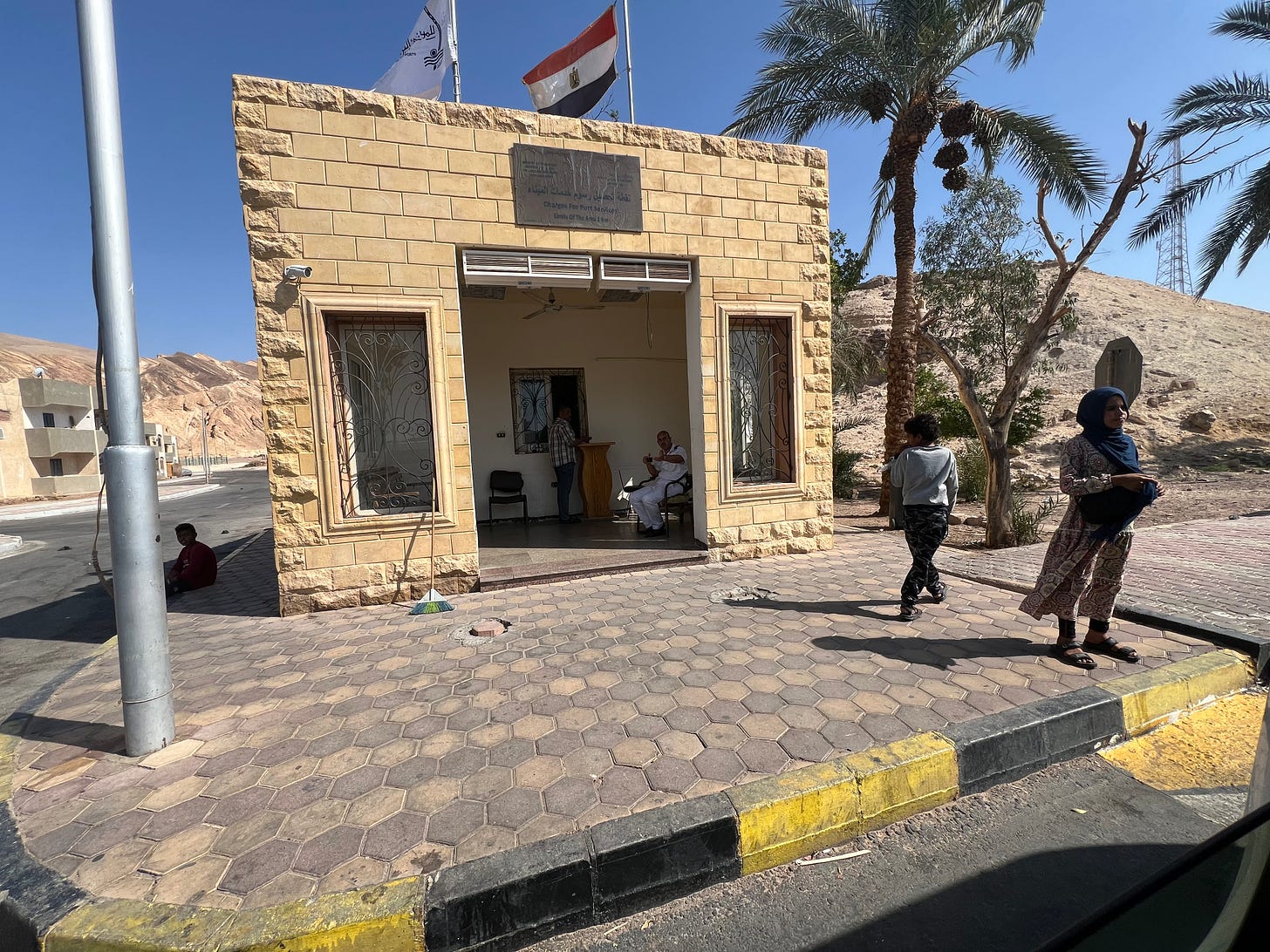Today started earlier than most of the other days of this adventure. In fact, besides for my night of no sleep at the Grosvenor casino in London, this was indeed the earliest start.
I woke up at about 3:30 am, packed up my stuff and then headed over to the meeting point of the day on Ramban St. Yes, for all of you wondering what exactly will transpire, you’ll just have to be a little patient. All will be revealed in due course.
I made myself a coffee and mentally prepared myself for the day ahead. It promised to be a long and rewarding one.
Just after 4:00 am, a nice Toyota minivan came and parked itself on the curb outside the little house on Ramban and the driver came out in full bluster and introduced himself as Leizer. He was a Vizhnitzer chosid, originally from Bnei Brak, who married a girl from Ashdod, moved to and lives in Ashdod (and pays a handsome 15,000 shekels a month for his mortgage) but not before he spent a brief seven year stint as a schochet in Postville, Iowa, a place familiar to Lubavitcher as the site of the great Rubashkin Scandal of the 2010’s.
Leizer didn’t love living in Iowa and moved back to the Holy Land. His only regret is not buying property in Iowa when he had a chance. He told me that houses in his day were selling for about $40,000 USD, a veritable steal in any economy.
I guess money was high on Leizer’s mind because he then told me to guess how much his Toyota Sienna costs. I guessed 150,000 shekel and he was delighted to tell me that it was 400,000 shekels. A number he later recanted and adjusted to 350,000 once he learned of my blogs, he didn’t want to get audited after all.
He considered the car to be quite fancy. I considered it to be a Toyota Sienna…
As we pulled away from Jerusalem in the predawn darkness, the sun slowly began to rise, revealing one of the most stunning landscapes I’ve ever witnessed. It was like watching a curtain rise to reveal the ultimate theatrical backdrop: the Dead Sea shimmering on our left, the dramatic mountains and crags of the Negev stretching endlessly to our right. At one point, we passed what could only be described as a phallic stone arrangement—Israel’s own Stonehenge-like contribution to roadside art.
I sat in the front seat and listened as Leizer yapped a little about how all the tourist spots in Israel were overrated and how the south of Israel is the most overrated of them all. I got tired eventually and sort of drifted into a half-sleep-half-gazing look out the window at the landscape.
A little before we entered Eilat, we stopped to put on tefillin and daven in the post-dawn, pre-border safety of the Holy Land. At our stop, we also loaded up on some snacks. I was feeling nostalgic for a LaHit chocolate bar and some classic noodle soups. When I went to pay,I watched the woman behind the counter serving a police officer. The server was very familiar and was softly scolding the officer for her hair not being in a tight enough ponytail. I thought this was a classic little Israel vignette—people so intertwined and familiar that they have no problem speaking as if they were long acquaintances even upon just meeting.
Then I heard the officer say “Thanks mum, I’ll see you at dinner,” and that just shattered any illusions I had. Serves me right for trying to build a mountain out of a molehill.
About ten minutes from the border, we were stopped as an officer suited up in what looked like bomb disposal gear. Whether there was an actual threat or just standard protocol, I’ll never know, but it certainly added to the drama.
The border crossing itself was a study in contrasts. On the Israeli side: high-tech, efficient, everything working seamlessly. I almost had a heart attack when they initially didn’t issue me my pink “petek” or exit slip, but thankfully that got sorted. Then we crossed into Egypt, and it was like stepping back in time—low-tech systems, broken machines, and that distinctly Middle Eastern inefficiency that makes you appreciate Israeli bureaucracy.
The best part? After navigating Israeli efficiency, we had to pay an exit fee that could only be paid in Egyptian pounds. I ran to exchange my 720 pounds ($15 USD), but of course, the machine was broken. The contrast was stark—from tap-to-pay convenience in Israel to standing helplessly in front of a broken ATM while a man behind the money-changing counter just stared at me and the rapidly expanding snaking line of denizens looking for their own share of the Egyptian economy. As my cousin Mendel observed, this was probably a bit of payback from the border officer for decades of Israeli dominance going the other way.
Thankfully, our driver Mahmoud came through with the money. Mahmoud turned out to be quite the character—A Bedouin, born near Jabal Mousa (according to some, the site of Har Sinai, hence named “Jabal” meaning “mount” and “Mousa” meaning “Moshe”) on the slopes of Mount St. Catherine, with a wife and daughter still living there. He has three brothers and five sisters, and somewhere during our journey, he blessed me to find a wife. I’ll take all the help I can get.
Mahmoud, our Egyptian guide—much like his Vizhnitzer counterpart across the border—was rocking his own fancy Toyota. He lamented about the cost—much like Leizer—yet, unlinke Lezier who owned his car, Mahmoud spoke with glowing eyes about his dreams one day to own his own car.
For now, he’d settle for driving his boss’s car. He and Leizer were quite alike. We then began the drive to Sharm el-Sheikh. On the way out of the border crossing, I made the mistake of taking a picture of a border guard, who got visibly upset and demanded I delete it. Little does he know about the “recently deleted” folder—modern technology wins again.
The drive through Sinai was absolutely stunning and deeply melancholic. Unfinished shells of houses dotted the landscape, and small huts topped with palm branches were like real-life sukkot. We watched women riding carts pulled by donkeys passed more abandoned construction projects. The water was pristine and stunning, but the area felt like a ghost town. Someone had clearly put serious thought and money into development once upon a time, then just pulled the rug out from under the investment.
[Note, Yossi (you’ll learn who he is a little later) explained to me that after Israel made peace with Egypt, they thought Sinai would become a popular tourist destination for Israelis and put money into developing the place. It turned out that didn’t end up happening. You can make peace on paper, but the locals have to welcome the guests too. It’s like my mother setting me up on a date with her friend’s daughter. It doesn’t really matter if they’re the best of friends, if I don’t like the girl, I’m not exactly going to marry her.]
Throughout the drive, one hand on the wheel, the other clutching his Samsung phone, Mahmoud rapid-fired Arabic to his friend “Ramadan” (which I think is a lovely name, makes me think of food) while bemoaning the lack of tourists: “Once upon a time people came; then they stopped.”
Nothing beats a true local taking you around a new city or place. Mahmoud also lived a life confined to his corner of the globe. He had never ventured further than Cairo and the concept of a 16-hour-long flight was so abstract to him that he had to equivocate the flying to a drive just to make sense of it. “So, flying 16 hours is like driving for 30 hours, right?”
The drive was scenic and memorable, the Sinai mountains framed the sea in a hazy beating sun, with water rippling in shades of periwinkle, azure, and every blue imaginable. The rocks were dry and arid, dusted with smaller stones like refuges for their tinier brothers. And still, the buildings lay empty—a mockery of the perfect nature surrounding them.
At one point of the drive, we were just over an hour from the alleged Mount Sinai, which is pretty wild to think of. We reached a fork in the road and went left, we were officially backwards tracing the footsteps of our ancestors. Although this time we had AC and a Bedouin driver with a million dollar smile.
My cousin Yuda told me about someone who climbed the mountain to “feel something” and reported back to the Rebbe, who responded: “Even if that is the right mountain (which it probably isn’t), Mount Sinai is an event, not a place.”
The ever graceful Mahmoud invited us to come back another time and see the burning bush—”holy place,” he said with genuine reverence. Throughout the journey, he had to hand over a little pad to various checkpoints, getting visibly frustrated each time. One officer had a pretty severe strabismus, which reminded me of Starla Whitehead from South of Broad by Pat Conroy.
And just one last comment on Mahmoud, who has until this point really been the highlight of the trip, adding that dash of color we all crave when we adventure. The sort of thing you can’t really prepare for, but adds degrees of enjoyment to the experience.
On the 14th of each lunar month, at the full moon, he takes his wife out into the desert roads, makes a barbecue, and falls asleep under the stars with some herbal Bedouin tea. There’s something beautiful about that tradition.
At the halfway point, we stopped at a gas station in Dahab for what turned out to be wonderful espresso. The guys were honest and friendly, despite warnings from my colleagues about Egyptians scamming American tourists. I got some stares but felt much safer than expected. As my cousin asked with a chuckle while rocking his baseball cap with tzitzit dangling by his side: “How Jewish do we look?” We are who we are, after all.
I should mention that the baby has been a dream this whole time, barely making a fuss. Of course, the moment I wrote that in my notes, he started wailing. Fitting for a Where’s Waylen blog to feature a wailing baby (see what I did there?).
The landscape shift was vivid—Israel’s softer beiges giving way to angry greys and greens, blacks and browns, with a hue of red adding to that harsh beauty. The mountains surrounding us were just divine—craggy, barren, dry, rocky, jagged, and absolutely stunning. I can see why the Jews might have been a bit disheartened trekking through this desert after leaving Egypt.
I fell asleep and woke up five minutes before reaching the airport.
At the airport, before we had a second to think, Mahmoud opened the trunk and unleashed what can only be described as a flock of Egyptians who grabbed our suitcases and ran toward the terminal. They weren’t stealing—they were aggressively competing for tips by lugging our bags a whopping 200 feet.
They were relentless, moving carts with our luggage out of reach each time we tried to reassert ownership, yapping about priority check-in (which was closed) and fast passes (again, check-in was closed). It was like a flock of seagulls descending on hot chips in England or pigeons attacking bread scraps in Rome. Let’s call them Flotsam and Jetsam.
Eventually, I told them: “I’ll give you 50 shekel if you fuck off.” They were terrifying, I overpaid, but I was glad when they dispersed.
I snagged a photo of the duo for posterity and Flotsam noticed and made an obscene gesture at me. Well, at least I have the photo.
We met a nice Belgian man named Yossi who spoke about Egypt’s lost potential: “They have all the coasts and they do nothing with it. The Mediterranean, the Red Sea, the Nile; they have it all.”
Then came passport problems—I’d stamped into Egypt on my Australian passport but tried leaving on my American one. TThere was a rela moment of panic when my border officer called over his superior and they spoke in Arabic while exchanging glances at me. Thankfully, it was sorted quickly with laughs and goodwill.
After security, a woman escorted us to the Priority Pass “Pearl Lounge.” I guess she recognized the confidence and wealth I exude and knew I must be upper-class bourgeoisie. The lounge was hot, smelly, quite full, and alcohol-free, but had great views of the tarmac.
Middle Eastern hospitality rules kicked in when a staff member approached with a face-splitting smile offering coffee. He was genuinely gracious, though I wondered if he just wanted a tip. He circled back for one many times throughout the two hour stay and didn’t get it, his Flotsam and Jetsam friends ruined the Egyptian tipping culture for me.
Soon it was time to board via the bus gate. An Australian brother and sister were on our bus. Then in perhaps the most bizarre turn of events on the trip, when we reached the top of the stairs and the door of the plane, there were two guys who checked every single bag by hand, rummaging through each piece of luggage and hovering suspiciously over the tefillin. This was followed by full pat-downs at the top of the stairs. Truly bizarre.
I scored a second-row economy seat and watched Shmuel (with green eyes, not blue, who attends my cousin’s shul in Nachlaot) whoop with delight upon discovering his—paid for—upgrade included footrests: "Yo! We have footrests!" It’s nice seeing young people enjoy life’s simple pleasures.
I had a lucky empty middle seat, with the window taken by a lovely Saudi woman in a hijab. I helped her with her suitcase overhead, and she flashed me a radiant smile. I was taking a photo of the view out of the window then she started to pose. I like how the photo came out, so kudos to you, let’s call you Fatima.
We took off, I immediately fell asleep, and woke up on approach to Riyadh, which looked uniform with nice clean lines. It did make me realize I know absolutely nothing about Saudi Arabia.
When we alighted the plane, I made a dash at it—not before letting Fatima go before me; we had developed a good thing—and was the first through security and first to the terminal.
We caught up with the dozens of other Jews on the flight and I watched as a couple of seminary girls headed off with a group of the yeshivah bochurim. No judgements here.
Having eight hours until our next flight to… ha! You almost got me. Cute. Well, no. Either way, we headed to but were rejected from the lounge—there were three women at the counter, and while my cousin was about to be let in, my attendant was a stickler and didn’t let us in before the prescribed four-hour-before-the-flight-admittance-time. Instead, we settled by a gate like plebes where the baby made quite a mess until our lounge time came.
I met a Bangladeshi man and a Nepalese guy, and we discussed cricket, Sakib Al Hassan, and Tamim Iqbal. I also chatted with an Egyptian from Cairo who’s always wanted to visit Australia.
Then came concerning news: U.S. air force planes were taking off from Saudi bases, after an Iranian missile attack hit a U.S. army base in Qatar.
Just my luck. Now there were risks of airspace closure. We weren’t dismayed and kept our spirits high as we headed to the lounge (successfully this time) for lovely little Pepsis with pull-tab cans, keeping one eye glued to the departure board for updates, cancellations, and delays.
And that’s where I leave you. My flight is scheduled to depart at 2:30 AM local time, and I’m writing this a little before midnight.’
You’ll have to stay tuned tomorrow to see where I’m heading and whether I actually make it there. But let’s be honest—whatever happens, it won’t be easy and it won’t be without hiccups.
This is Where’s Waylen, after all.
Until next time!

